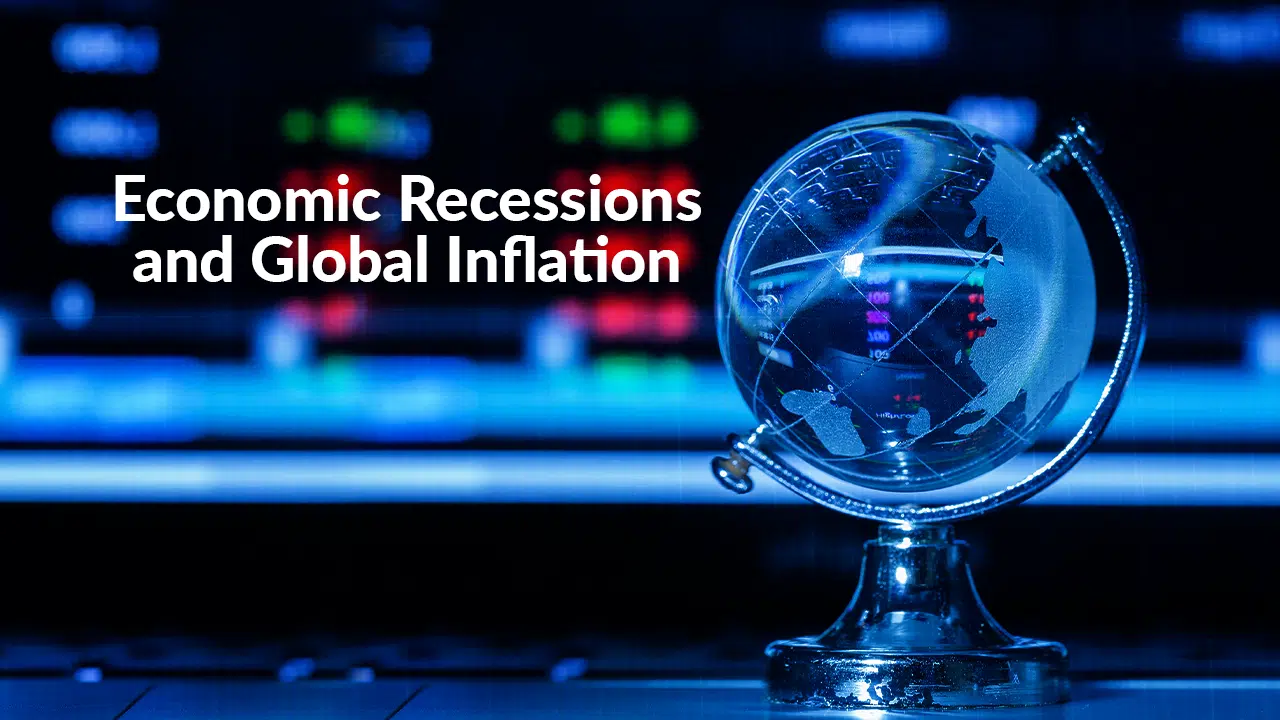Economic shifts touch everyone’s lives, and lately, the buzz around inflation and recession has grown louder. You might find yourself glancing at rising prices or tightening your budget, wondering how to adjust to this ever-changing financial landscape.
Here’s a fact that could draw your attention: Two-thirds of economists previously anticipated a global downturn as early as 2023.
In this article, we’ll unravel the complex world of economics in terms you can easily grasp. We’ll explore what predictions for 2024 might mean for your wallet and share strategies to navigate these choppy waters with confidence.
Ready to gain insights and take control? Keep reading; clarity is just ahead.
Understanding Economic Recessions and Global Inflation
In the intricate dance of economics, inflation and recession step to a complex rhythm—each influencing the global stage in profound ways. Gaining clarity on these concepts is paramount; understanding their nuances not only demystifies current fiscal realities but also equips us with foresight into the economic tides that may shape 2024.
Inflation vs. Recession: Key Differences
Understanding the nuances between inflation and recession is critical for navigating the financial landscape, especially as we look toward 2024. Both economic phenomena affect markets, household budgets, and policy decisions, yet they manifest distinctly. Here, we present a concise comparison:
| Inflation | Recession |
|---|---|
| Typically characterized by rising prices for goods and services. | Denoted by a significant decline in economic activity across the economy, lasting more than a few months. |
| Results from an excess of demand over supply or increased production costs. | Occurs when there is a widespread drop in spending, often triggered by a loss of consumer confidence or financial crises. |
| Measured by the Consumer Price Index (CPI) and other inflation metrics. | Reflected in gross domestic product (GDP) decline, high unemployment rates, and reduced manufacturing output. |
| Can erode purchasing power and reduce the value of currency. | May lead to business failures, layoffs, and increased government borrowing. |
| Central banks manage inflation through monetary policy, such as altering interest rates. | Governments and central banks may implement fiscal stimulus or monetary easing to combat recession. |
| Interest rate hikes are a common measure to cool down inflation. | Interest rate cuts are often used to stimulate economic growth during recessionary periods. |
Both inflation and recession present unique challenges that require careful monitoring and strategic responses. Policymakers must strike a balance to maintain economic stability, a task highlighted by the recent global situation where rate hikes, aimed at managing inflation, potentially edge economies towards recession. European measures against inflation, for instance, have influenced how the European Central Bank responds compared to its U.S. counterpart. Central bank decisions, as criticized in Japan, serve as a reminder that the timing and scale of interventions are pivotal to economic outcomes.
The Link Between Inflation and Recession
Inflation means prices go up. Recession is when the economy slows down. Sometimes, inflation can cause a recession. This happens when central banks increase interest rates to stop prices from rising too fast.
Higher interest rates make it cost more to borrow money.
Economists watch both inflation and recession closely. They saw big price increases in Japan recently – the highest in over 40 years! Central banks were slow to react, but then they raised interest rates.
High inflation hurts people’s wallets and scares businesses from investing. When things cost more, people buy less stuff. Companies sell fewer products and might not hire as many workers or give raises.
This could lead to a recession if it gets too bad.
To keep prices stable, central banks try to control how much money there is and what borrowing costs are like through things called monetary policy tools. Additionally, you can also read about- How the Gig Economy Overcome Recession?
Global Economic Recession and Inflation: A 2024 Forecast
As 2024 approaches, the specter of a global economic downturn looms, intertwined with persistent inflationary pressures—factors that promise to redefine the landscape of international finance and commerce.
Analysts pore over indicators, from aggressive interest rate hikes by central banks to escalating energy costs in G-7 countries, weighing their combined potential to thrust economies into a state of recession while grappling with cost-of-living crises.
Risk of Global Recession in 2024
Economists are sounding alarms about 2024. They fear a global recession could grip the world. Signs point to trouble ahead with high inflation, energy costs soaring, and central banks raising interest rates all at once.
Many countries could see their economies shrink. The International Monetary Fund warns even strong nations might struggle to grow. If these trends keep up, jobs may be lost and businesses could close down.
It’s a tough situation that might hit everyone hard.
Simultaneous Rate Hikes and their Impact
Central banks around the world took action as inflation rates began to climb. They raised interest rates at the same time, hoping to control the prices that were rising fast. This move had a big effect on both people and businesses.
Higher interest rates mean borrowing money costs more. For families, this can make loans for houses or cars much pricier. Companies might decide not to spend money on growing their business because it’s too expensive to borrow.
Sometimes, they may even need to let workers go to save money.
Even though these rate hikes help slow down inflation, they also make it harder for economies to grow quickly. In places like the US and Brazil, it cooled off soaring prices but also slowed down other parts of the economy.
Rising Energy Costs Across the G-7 Nations
Energy costs are soaring for the G-7 nations. People and businesses feel the pinch as bills go up. These countries, including the US, UK, Canada, France, Germany, Italy, and Japan face a tough challenge.
High energy prices push overall expenses higher.
Prices for oil and gas have jumped sharply in recent times. This affects everything from heating homes to running factories. The G-7 is working hard to manage these rising costs. They aim to keep their economies stable and protect citizens from extreme financial stress.
Leaders seek solutions like finding alternative energy sources and helping those hit hardest by price hikes. They know high energy costs can slow down economic recovery after recessions or crises like COVID-19.
Each nation is trying different ways to shield people from having less money because of expensive energy bills.
The U. S. Economy Amid Global Inflation and Recession
As the world grapples with economic headwinds, the U.S. economy stands as a beacon of interest—its performance amidst global inflation and recession teeters on strategic policy decisions and market resilience.
The interplay between domestic recovery efforts and international financial turbulence will significantly shape America’s economic landscape in 2024, illuminating paths for potential growth or signaling caution for impending challenges.
U.S. Economic Recovery Compared to G-7 Nations
As 2024 unfolds, the U.S. economic recovery trajectory showcases distinctive contrasts with other G-7 nations—illuminating varied approaches to monetary policy and fiscal resilience; delve deeper into these dynamics for a comprehensive understanding of their global implications. If you want you can also read- World Economy Ranking.
U.S. Labor Market Recovery
Amidst the swirling uncertainties of global inflation and recession, the U.S. labor market shows signs of resilience, with unemployment rates inching towards pre-pandemic levels. This nascent recovery, marked by burgeoning wage growth and shifting labor-force participation, hints at an economy striving to find its equilibrium in a world beset by economic disruptions.
U.S. Economic Outlook for 2024
The U.S. economy is gearing up for an exciting 2024. Experts predict it will outshine other major industrial nations, thanks to a solid foundation laid in recent years. The labor market is buzzing with activity, marking a historic rebound from the pandemic’s blows.
Jobs lost have been regained, and unemployment rates are impressively low.
Efforts by the Biden administration play a huge role here. Big wins like the Inflation Reduction Act and American Rescue Plan have set the stage for economic resilience. They aim to lower consumer costs while boosting job creation through investments in clean energy and domestic supplies.
With these measures in place, Americans can expect sustainable growth and continued prosperity as we move forward into 2024.
Looking at fiscal policy, things seem promising too. The government’s strategy focuses on strengthening our economic independence and tackling inflation head-on—the kind of proactive planning that could steer us clear of potential downturns seen elsewhere around the globe.
Strategies to Manage Inflation and Recession
In times of economic uncertainty, devising shrewd strategies is paramount for safeguarding one’s financial stability amidst the twofold challenge of inflation and recession; stay tuned as we unravel methods to navigate these tumultuous waters effectively.
Building Emergency Savings
Start by setting aside money each month for emergencies. Even small amounts can add up over time. Think of this fund as a safety net to catch you if unexpected costs arise, like medical bills or car repairs.
Keep your emergency savings in an account that is easy to access when you need it. It’s important not to touch this money unless you have a real emergency. This way, it will be there for you when times get tough.
Evaluating Spending and Investments
Check your spending habits carefully. Cut back on non-essential expenses. It’s important during tough economic times. Look for ways to save money each month.
Review your investments too. Market swings can affect them during inflation and recession periods. Diversify to protect your savings from these ups and downs. Consider bonds, stocks, or real estate in different sectors.
Talk with a financial advisor if you need help. They can guide you through investment choices that fit your goals and risk level. This advice could help soften the impact of market changes on your portfolio.
You May Find Interest: World Bank Warns of Higher Interest Rates
Conclusion
Times are tough with global inflation and the threat of recession, but there’s hope. We’ve explored what makes them tick and know they can shape our world in 2024. Staying informed helps us manage our money better and make smart choices.
Together, we can face economic challenges head-on. Let’s keep learning and adapting to thrive in the future!











































